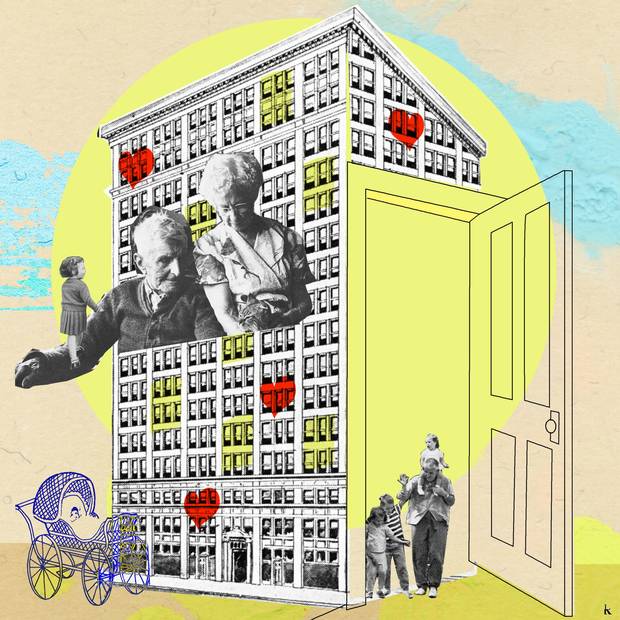Facts & Arguments is a daily personal piece submitted by readers. Have a story to tell? See our guidelines at tgam.ca/essayguide.
We've lived in our building for more than 10 years and all around us the price of housing has soared. Forget buying a house, we couldn't even afford to move out of our apartment and then back in. So, we continue to live here and we aren't the only ones. Our building is filled with long-term residents, many of whom have been here for decades longer than we have. Some are families with children like us, but most are older. Much older.
They have watched our family begin and expand. They have seen our sons grow from tiny infants to young boys. There is a lot of: "My goodness you two have grown," and, "I remember when you were always in the carrier."
But, more often than not, their comments are directed toward us – the parents. They are constantly complimenting my husband and me on our children – on our parenting. It is, without a doubt, the single most surprising benefit of knowing a lot of older people. To be told over and over again that yes, you are doing a good job. That they saw the boys outside and they were so great. That, therefore, you are great parents. And it's said just like that. There is no qualifier. There is no, "it seems that you are good parents." There is no, "well, so far so good." It's said as an unshakable truth.
"I know it's not easy, but you are good parents."
It isn't really true, of course; we are completely average parents. Sometimes getting it right and sometimes getting it very wrong, but the seniors who live in our building are so generous with their praise that eventually even you start to believe it. That's something I've learned from them. It isn't enough to compliment a person once. You must do it many times to be believed.
But just as time has aged us, it has also aged them.
My neighbours are beginning to die and my grief is almost overwhelming.
It's overwhelming, in part, because when you know so many older people, you suddenly realize how ordinary dying actually is. One exists and then one doesn't. The suffering happening behind closed doors is invisible to most of us. One week you share with them a silly joke about the reluctant spring weather and then two weeks later you hear that the person died after a short illness.
It's heartbreaking in its simplicity. And recently in our building in its regularity.
It's also hard to explain this grief. What are we to each other?
Family is clearly too strong. As is friend, in most cases. But the word acquaintance doesn't do the relationship justice. Neighbour is possible, but neighbours in apartment buildings are quite different than neighbours in houses or even in condos. Neighbour seems too clean-cut. Apartment-building dwellers have seen each other with dirty hair and PJs in the laundry room while fighting the flu. We've seen each other's lumpy bodies in the pool changing rooms. We know that each of us has an outside persona and an inside one because we've spoken to both.
If you live in an apartment building, then you also live part of your life in that funny space – the not quite private yet not totally public space of the hallway, the elevator, the laundry room, the pool. Those shared spaces offer a different kind of community. It's those areas of the building that have taught my children how to be good citizens. To respect shared space, to leave things in better shape than they found them, to let people off the elevator before climbing in even if you are desperate to get home, to hold doors open for people, to ask if they need help carrying the heavy bags, to greet people and their dogs with equal enthusiasm (okay, that's hard, but we try to greet the owners as well) but most importantly to stop and have real conversations with people you know by sight and laundry habits, if not always by name.
Doing this in an apartment building gives you an almost endless supply of support. You know, somehow that if anything were ever to happen to you, there would be support almost immediately, if not at your door then in the halls. In a strange and almost old-fashioned way, we love each other.
There are times when I wished that my children could grow up in a house, could stomp as loudly as they wanted on the floors, that it didn't take six elevators trips to do laundry, but then I don't think they'd quite be the same boys and I know we wouldn't be quite the same parents.
These residents have had an imprint on not only our family's daily life but also on our collective character. The English language needs a word for these special apartment-building relationships. Neighbour is just not good enough.
Katarina Ohlsson lives in Toronto.
